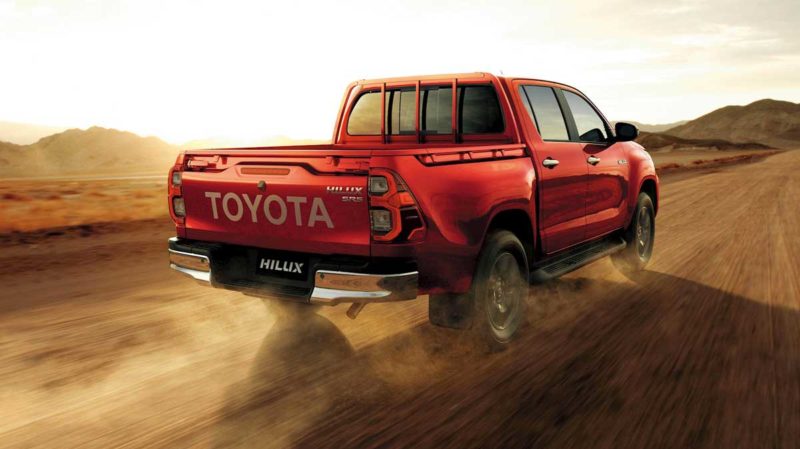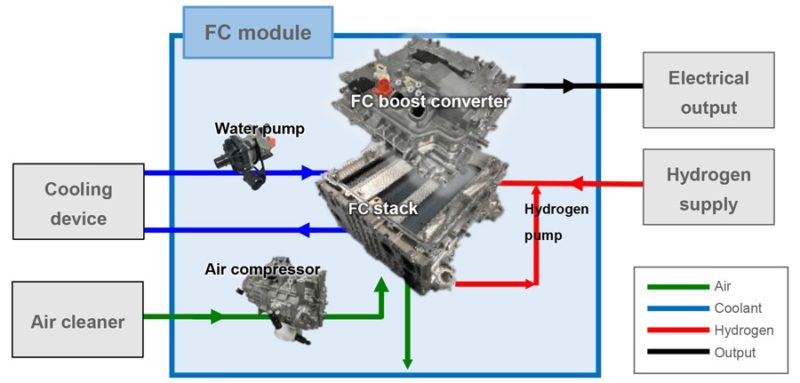Japanese automotive giant Toyota has unveiled a fuel cell system module that the company claims can be easily adapted to a variety of products including trucks, buses, trains, and ships, as well as stationary generators.
Toyota unveiled its new hydrogen fuel cell (FC) system at the end of February, a compact module available in four models that the company hopes to begin selling anytime now.
Stemming from the company’s experiences in developing hydrogen fuel cell systems – such as in the Mirai FC electric vehicle (FCEV) and Sora FCEV bus – as well as its larger efforts to popularise FCEVs and fuel cell technology, Toyota hopes this new module system will suit the needs of companies across a variety of industries.
Toyota has identified hydrogen fuel cells as an important tool in decarbonising a variety of sectors and contributing to achieving carbon neutrality.
In addition to the lessons learned through selling the Mirai – which Toyota launched in December and which is expected to begin selling in Australia this year, after the first models landed on our shores last month – and Sora FCEVs, Toyota has also been selling hydrogen FC systems to fuel cell product companies, as well as allowing royalty-free use of its FCEV-related patent license.
Toyota’s newly launched product packages in a single compact module an individual hydrogen fuel cell system along with components that enhance performance, such as the FC stack, as well as components that handle air supply, hydrogen supply, cooling, and power control.
In particular, Toyota’s experience with fuel cell development led to the company being able to eliminate the humidifier, instead circulating water generated during power generation through the FC stack.
This, in turn, has led to what Toyota describes as “world-class, top level” output density per unit volume.
Toyota’s new hydrogen FC system will be available in four models – a vertical type in either 60kW or 80kW and a horizontal type in either 60kW or 80kW.
Boasting a wide voltage range from 400V to 750V, the new FC system can be directly connected to an existing electrical instrument provided with a motor, inverter, battery, etc, thanks to the system’s built in dedicated FC boost converter that, according to Toyota, “simplifies the development and manufacture of FC products.”
Each of the four FC module models can be combined according to the necessary application, flexibly adapting to the output level and amount of installation space available.
The fuel cell’s modular nature eliminates the need to create designs for purpose-built FC system-related components, while simultaneously reducing the number of locations the module must be connected to a device, allowing for easier installation.
As such, Toyota’s new FC system module can be used for a wide array of products, including trucks, buses, trains, ships, and stationary generators.
Able to be operated in a broad range of operating environments, at low or high temperature, at higher altitude or under applications involving vibration, the new fuel cell module will also come with expert input from Toyota’s engineers in determining the optimal layout and design to maximise fuel economy, usage duration, and running costs.
Schematic example of connecting the FC module to an external device
Toyota’s experience with hydrogen fuel cell development, such as the development of FCEVs and HEVs, has allowed the company to create a range of safety countermeasures which will ensure safe use of hydrogen and high voltage, based on the basic approach of ensuring that hydrogen does not leak and, in the unlikely event that a leak should occur, ensuring immediate detection of the leak and stoppage of the fuel cell.
Joshua S. Hill is a Melbourne-based journalist who has been writing about climate change, clean technology, and electric vehicles for over 15 years. He has been reporting on electric vehicles and clean technologies for Renew Economy and The Driven since 2012. His preferred mode of transport is his feet.



